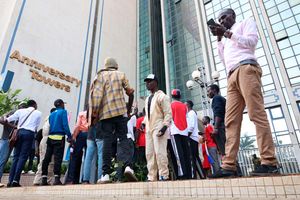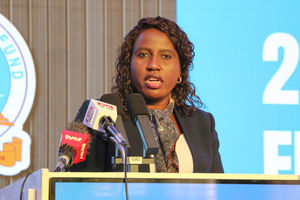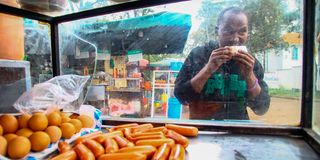
Magati Okenye Edgar, a student at the University of Nairobi eats boiled eggs during an interview at Klabu, a food joint at UON, on March 13, 2025.
It’s just past 1pm at the University of Nairobi and from a distance, it looks like a scene brimming with youthful ambition.
Students spill from lecture halls, gathering in lively knots under the midday sun, books clutched tight, conversations buzzing.
Yet beneath the buzz of campus life runs an invisible current – a quiet, gnawing hunger hidden behind bright smiles and busy footsteps. They call it ‘kuinama’ – a silent ritual of bowing to necessity, where a meal is not a given but a distant hope.
In a place meant to nourish minds, it is the stomachs that often go empty.
For many students, lunchtime is not a break to replenish, but a chance to hide their hunger with busyness.
What looks like discipline - studying, revising, catching up - often masks empty stomachs and fraying dignity.
The old dream of campus freedom is giving way to a harsher reality: rationing bread, surviving on water, and treating meals as a rare luxury rather than a daily routine.
"I went half a day without a proper meal and found it hard to concentrate in class," says Glory Mukami, a third-year student at the University of Nairobi.
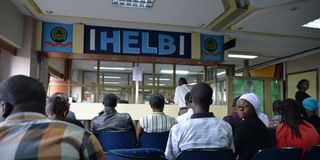
The Higher Education Loans Board offices in Nairobi.
It's not always by choice. Sometimes delayed Higher Education Loans Board (Helb) disbursements and soaring food prices on campus force students into hardship, where even a plate of rice and beans feels extravagant. Shame and the need to appear resilient drive many to adapt - running, reading, pretending, even fasting under the guise of faith to hide their hunger.
"Helb should be paid in full and on time, and the amount should be the same for all students. At the moment, Band Five students get the least, while Band One students get the most. They even release it in order, from Band One to Five, which makes the wait even longer for some of us," says Caleb, a second-year student.
The bands Caleb talks about were in the new university funding model, which the courts had initially thrown out but later gave the Education ministry a brief reprieve to continue using it.
For Band 1, the government scholarship covers 70 per cent, the loan will cover 25 per cent and the upkeep loan is Sh60,000.
In Band 2, the government scholarship covers 60 per cent and the loan covers 30 per cent. For this category, the upkeep loan will be Sh55,000 while the families contribute 10 per cent.
For Band 3, the government scholarship covers 50 per cent, and the loan 30 per cent. The families contribute 20 per cent while the upkeep loan is Sh50,000.
For Band 4 the government provides 40 per cent scholarship and 30 per cent in tuition loans with the remaining 30 per cent of the fees left to the students. The final category requires families to pay 40 per cent of the fees with both tuition and scholarship capped at 30 per cent each.For many students, Helb is the difference between eating and going to bed hungry.

Magati Okenye Edgar, a Bachelor of Arts student in Political Science and Public Administration at the University of Nairobi, purchases a boiled egg during an interview at Klabu, a food joint at UON, on March 13, 2025.
Magati Edger Okenye, a fourth-year Political Science student at UoN, shared his struggles with revealed the hardships he faced before receiving his Helb loan.
"One of the biggest challenges I faced was accommodation because I had to wait for the money. We pay a lot of money — between Sh38,000 to Sh45,000 in one academic year," says Magati.
But why has ‘kuinama’, which means bowing in formal English, become part of student life?
Helb is designed to cover tuition fees, rent, food and essentials for those who apply, but a sharp increase in student numbers has stretched the funds thin. With more students competing for limited support, delays have become common.
So, when the little money allocated doesn't arrive on time, students are left to borrow coins, skip meals and struggle to survive.
"The delay in Helb disbursement makes it difficult for us to pay school fees on time, and that means we struggle to register our units," says Mike, a second-year student.
Frustrated by delays in the disbursement of student loans, university students protested on February 3, 2025.
At Kenyatta University, they blocked Thika Road for hours before police dispersed them, while students at the University of Nairobi marched to Anniversary Towers and stormed Helb offices.
In response, Helb announced that it would revert to the old disbursement model for first and second-year students, pending an appeal against the suspended new funding system.
It's common to hear 'Leo nainama' (I'm bowing today) among students, while social media jokes about surviving on 'air pies' and 'prayer fasting' mask a serious crisis.
Hunger is affecting concentration, mental health and academic performance. Some students are asking for help; many are suffering in silence. Beyond rent, daily survival is now a struggle.
"When you lack money, you face many challenges. You can decide to borrow from a friend, but you still have to pay it back. Sometimes borrowing, especially almost daily, becomes difficult and results in going to bed on an empty stomach," Edger says.
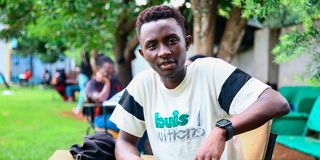
Moses Kuria, a student of Education Arts at Mount Kenya University Thika, during an interview at the university on April 5, 2025.
Long associated with public institutions, the Helb crisis has now cast its shadow on private education, with students at private universities joining the chorus of despair sweeping Kenya's higher education landscape.
"I applied for my Helb loan in August 2024, but so far nothing is promising," says Moses Kuria, a third-year education student at Mount Kenya University (MKU), his voice heavy with frustration.
He adds: "We are expected to sit the exams without the financial support we were counting on."
Dozens of MKU students sacrificed valuable class time to stand in seemingly endless queues, hoping for answers from visiting Helb officials. Many left more disheartened than when they arrived.
"You stand for hours only to be told 'the issue is being looked into'," Kuria says. "We need solutions, not more promises."
This growing crisis threatens to derail the academic progress of thousands, as students face the impossible choice of attending classes or chasing the funds needed to stay in those very classrooms.
"You're spending more years on campus than necessary because you've been forced to postpone semesters due to delays in Helb disbursements, the very funds that are supposed to cover your tuition fees," says Vincent Nderitu, a second-year IT student whose academic timeline has been stretched by financial uncertainty.

Vincent Nderitu, a student of Information Technology at Mount Kenya University Thika, during an interview on April 5, 2025.
The situation for private university students carries an additional burden that their public university counterparts don't face.
"In private universities, the Helb mostly covers tuition fees. When it comes to daily survival, food, accommodation, books, you're completely on your own," explains Elvis Presley, a third-year Education student whose academic journey is hanging in the balance.
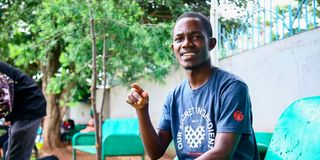
Elvis Presley, a student at Mount Kenya University in Thika, during an interview at the university on April 5, 2025.
"We are expected to somehow focus on our studies while struggling to meet our basic needs."
This inequitable system has created a class of students who, despite gaining admission to higher education, are unable to focus on their studies as the daily struggle to survive consumes their energy and attention.
"When Helb disbursements are delayed, parents often find it hard to believe us. Some even suspect that we have misused the school fees because they don't understand the real hardship we face during these delays," explains Gladys Gicheru, an articulate second-year literature student.
Beyond meals, the Helb delay has also taken a toll on campus relationships.

Gladys Gicheru, a student of Special Needs Education in English Literature at Mount Kenya University Thika, during an interview on April 5, 2025.
"You find that you can't even take your girlfriend to 'Klabu' - the popular student eatery - just to buy her juice because you can't afford it, especially every day. This makes dating difficult and often leads to break-ups," says Mike.
For some, financial hardship has led to break-ups, while others have resorted to cheap 'dates' such as long walks. Sadly, hardship has also led some students, especially young women, to enter into exploitative relationships with older, wealthier individuals (sponsors) outside of campus.
From an annual enrolment of 24,164 in 1989/90 financial year, when Kenya had five public universities, to the post-2010 explosion when the enrolment first hit 100,000 and jumped to 400,000 in 2016/2017 the admission of 444,572 in 2023/2024 indicates a significant growth, according to the Kenya National Bureau of Statistics (KNBS).
Kenya now has 35 public universities and 33 private ones that also enjoy Helb disbursements, further straining the resources.
Publicly available data on Helb disbursements start at 2012/13 when it disbursed Sh4.89 billion to public universities, which jumped to Sh9.469 billion in 2019/2020. There was then a drop in the next three years before hitting a record high of Sh20.38 billion in the 2023/21024 financial year.
Helb applicants in public universities peaked at 544,045 in the 2023/2024 financial year, up from the lows of 124,554 applicants in 2013, which moved to 221,816 in 2017/18. They hit the 400,000 mark in 2022/23, with a total of 416,001 applicants.
The applicants vary from enrolment as it also counts post-graduate programme applicants, as well as those that did not apply in their first years, and would want to do so in their later years.


